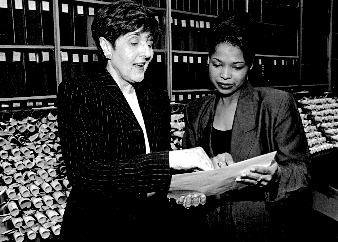|
|
Countdown To Commencement DayBeginnings: Special Events director Deb Stewart prepares for her first JHU graduation
Greg Rienzi |

When the last student has received the last diploma, the chief marshal uttered her final words to this graduating class and the last chair folded up and put away, then, and only then, can Deborah Pankey Stewart breathe a sigh of relief.
Until that moment, Stewart will walk on the edge.
But as director of the Office of Special Events, Stewart knew what she was in for when she accepted this job last June. Having helped to plan numerous graduation ceremonies for her previous employer, Baltimore City Community College, Stewart was aware of the effort and coordination needed to pull off an event like this. And she was no stranger to a Hopkins university-wide commencement; she had attended last year's ceremony and recalls how smoothly the procession went and how the day seemed to go off without a hitch.

With a week to go before commencement, Registrar Hedy Schaedel discusses seating plans with Deborah Stewart. Precision is vital to assure that each student receives the correct diploma. |
But that was before she was the one directing the action. These days, Stewart says she has an even greater respect for what went into planning last year's commencement.
For the past four months Stewart and her staff have taken part in about a dozen meetings with various campus officials, arranged for musicians to play the processional and recessional themes, ordered floral arrangements to be delivered and sent off 2,750 invitations. Even with the May 21 ceremony just days away, Stewart is still making sure that everyone knows what to do when they get on that stage. Despite her confidence in her ability and her attitude that everything will be fine, she does admit to being just a bit apprehensive as the moment of truth nears.
"I'm a little nervous about the script. Everything is connected to it," Stewart says of the 57-page document she authored that has precise instructions dictating how everything must be carried out on the day of the event. For instance, she says, because there will sometimes be more than one speaker on stage, it's important which of the three microphones a speaker goes to. The script also contains such minute instructions as when a marshal should nod to President Brody or step back on the stage.
Work for this commencement began in January. On Stewart's agenda was a 12-page checklist of duties she and her staff needed to accomplish such as calling the School of Medicine to arrange for a physician for the ceremonies, planning food with the Johns Hopkins Club and Catering Services and drafting letters outlining the event for all trustees and administration. And that's when Stewart's team received a bit of a blow: The office's administrative assistant--who had been through five commencements--decided that January would be a good time to retire.
So Stewart had to take time out of her schedule to find a temporary replacement, who, among other duties, would deal with all the letters and invitations that needed to be mailed and would assist her with commencement arrangements.
Yet, despite this minor setback, Stewart did have experience on her side.
Armed with a bachelor of science in music education degree from West Virginia University Institute of Technology, Stewart went into the administrative side of the arts, first as coordinator of educational programs for the Baltimore Symphony Orchestra, then as general manager of the Milwaukee Chamber Orchestra and as recruitment specialist in the music department at the University of Wisconsin-Milwaukee. Back in Baltimore, Stewart spent eight years at Baltimore City Community College as a special events specialist and publications director.
Stewart describes her experience at previous graduation ceremonies as that of a hands-on troubleshooter. Her new role, though, is that of a conductor presiding over an orchestra, rather than one of those playing an instrument.
Stewart attributes that in part to the fact that Hopkins' commencements have changed little throughout the years.
"If it's not broke, don't fix it," Stewart utters.
During the academic year Stewart also plans cultural events such as the Wednesday Noon Series, a weekly program of lectures, concerts and other happenings held at Shriver Hall and the Clipper Room. The Office of Special Events is also responsible for weekend concerts and assisting in ceremonies held at Homewood, such as the presentation to George Bush of the 1997 Albert Schweitzer Gold Medal for Humanitarianism Award.
However, commencement is certainly No. 1 on Stewart's priority list. There are 6,500 programs to be distributed, 21 marshals who have to know what to do, 5,000 chairs to be lined up, an orchestra that needs to hit all the right notes and students who must all be in their proper seats under a 100-by-260-foot tent.
But with all the late nights fine tuning the script, weekends of taking work home and countless phone calls she's had to make and receive, Stewart says all the effort will be worth it if everything goes as planned.
| GO TO MAY 18, 1998 TABLE OF CONTENTS. |
| GO TO THE GAZETTE HOMEPAGE. |